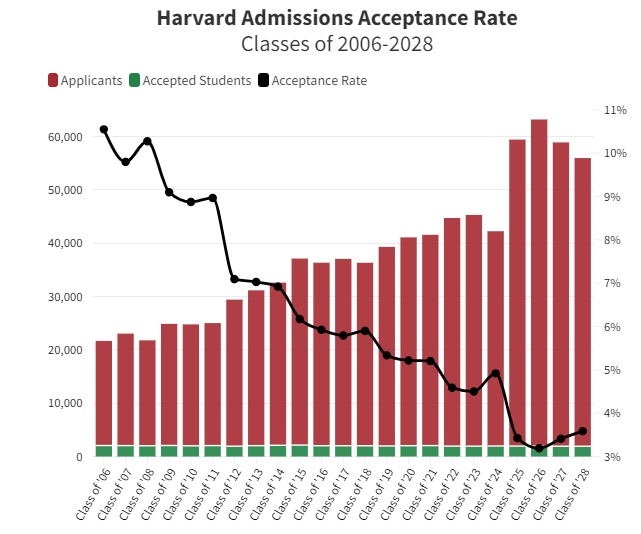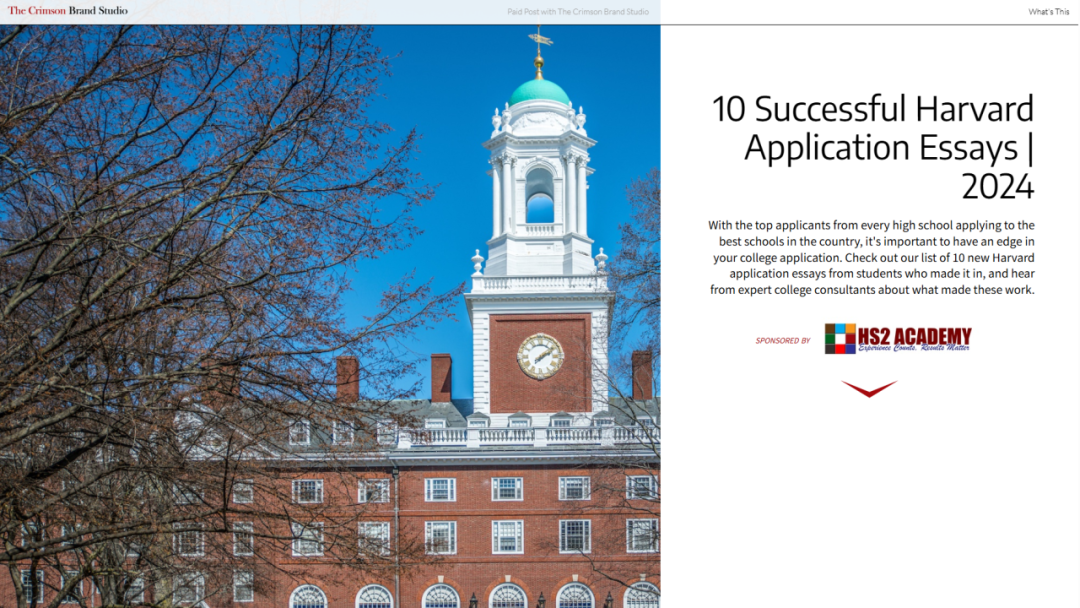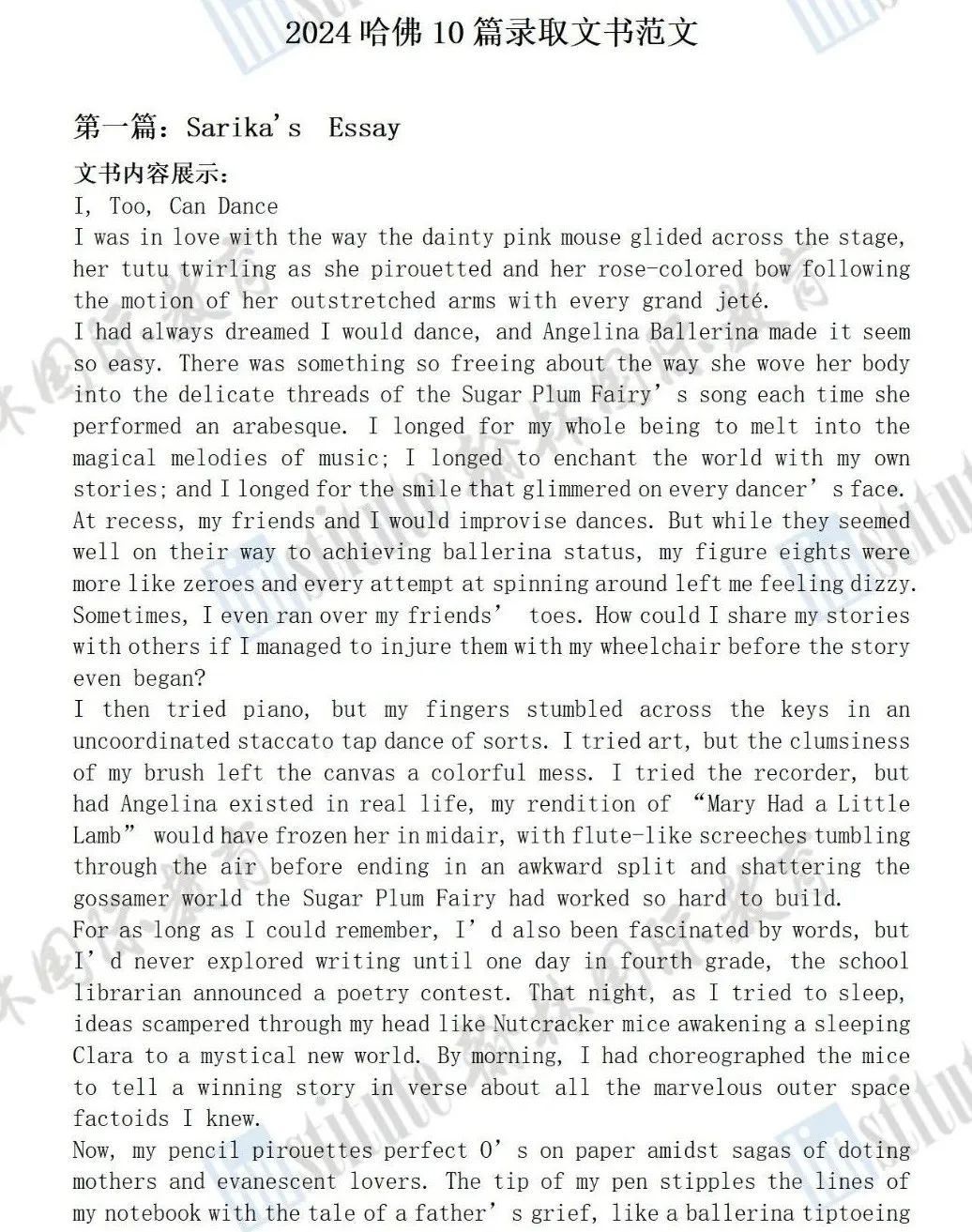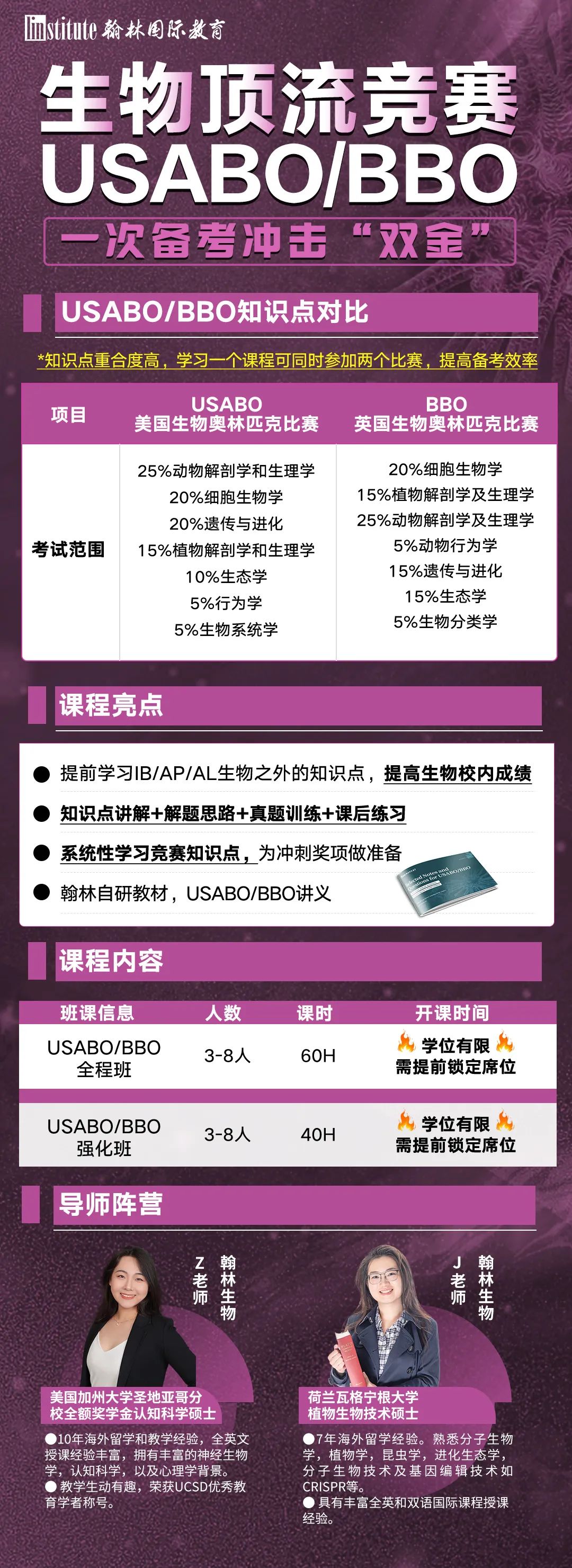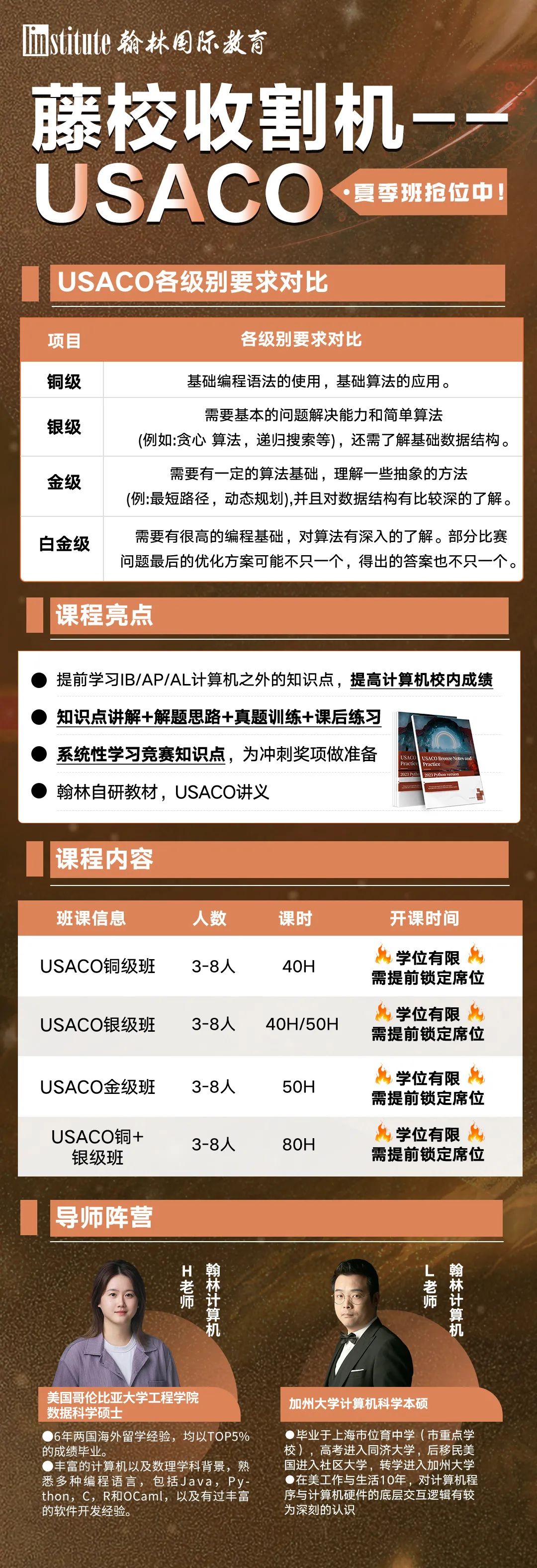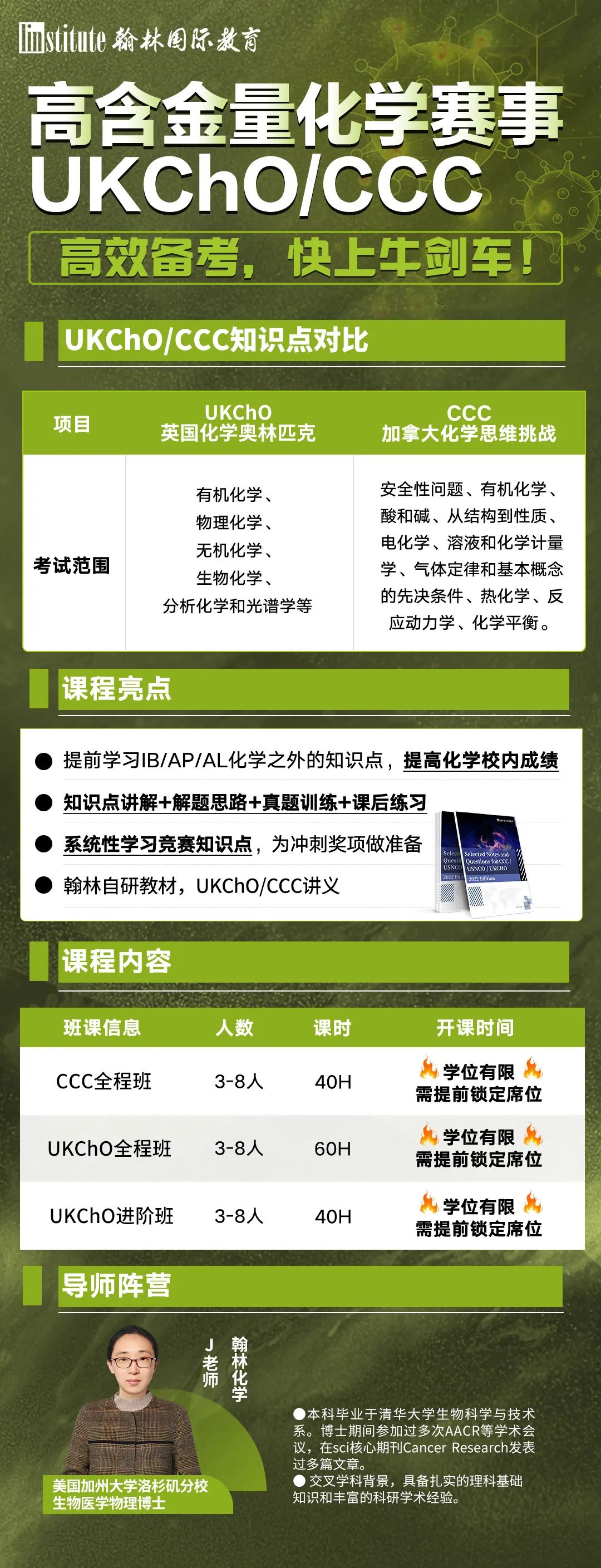|
哈佛大学在2024Fall共收到54,008份申请,欧博娱乐比去年减少 5.14%,共有1,937人被录取。录取率达到了近四年来最高,约为 3.6%。
图源:网络 如今,在大环境的影响之下,学霸们的标化、课外活动履历其实都已经不相上下。但是,优秀的文书可能会帮助他们取得意想不到的成绩!一篇逻辑清晰明确的文书可以让招生官直接了解他们的综合素质能力并且留下深刻的印象。 哈佛大学也公布了最新录取哈佛的优秀文书,快来看看“神仙打架”中胜出的文书到底写了哪些内容吧!
图源:网络 哈佛大学公开优秀文书 哈佛大学提到:每所高中的杰出申请者都竞相申请本国顶尖学府,因此,在大学申请中占据优势地位显得尤为关键。 为此,欧博allbet我们特地整理并呈现了全新系列的哈佛申请论文范例,这些论文均出自成功入学的学生之手,旨在让广大申请者从中汲取经验,了解并学习如何撰写一篇出色的申请论文。 同时,也邀请了大学的专家们,深入剖析这些论文的撰写技巧与成功要素,为广大申请者提供宝贵的参考和指导。 1.Sarika'sEssay 招生官评价道:“Sarika深刻的反思和对艺术表现形式多样的成熟认识,是她的文章如此感人的原因。” 文书内容展示: I, Too, Can Dance I was in love with the way the dainty pink mouse glided across the stage, her tutu twirling as she pirouetted and her rose-colored bow following the motion of her outstretched arms with every grand jeté. I had always dreamed I would dance, and Angelina Ballerina made it seem so easy. There was something so freeing about the way she wove her body into the delicate threads of the Sugar Plum Fairy’s song each time she performed an arabesque. I longed for my whole being to melt into the magical melodies of music; I longed to enchant the world with my own stories; and I longed for the smile that glimmered on every dancer’s face. At recess, my friends and I would improvise dances. But while they seemed well on their way to achieving ballerina status, my figure eights were more like zeroes and every attempt at spinning around left me feeling dizzy. Sometimes, I even ran over my friends’ toes. How could I share my stories with others if I managed to injure them with my wheelchair before the story even began? I then tried piano, but my fingers stumbled across the keys in an uncoordinated staccato tap dance of sorts. I tried art, but the clumsiness of my brush left the canvas a colorful mess. I tried the recorder, but had Angelina existed in real life, my rendition of “Mary Had a Little Lamb” would have frozen her in midair, with flute-like screeches tumbling through the air before ending in an awkward split and shattering the gossamer world the Sugar Plum Fairy had worked so hard to build. For as long as I could remember, I’d also been fascinated by words, but I’d never explored writing until one day in fourth grade, the school librarian announced a poetry contest. That night, as I tried to sleep, ideas scampered through my head like Nutcracker mice awakening a sleeping Clara to a mystical new world. By morning, I had choreographed the mice to tell a winning story in verse about all the marvelous outer space factoids I knew. Now, my pencil pirouettes perfect O’s on paper amidst sagas of doting mothers and evanescent lovers. The tip of my pen stipples the lines of my notebook with the tale of a father’s grief, like a ballerina tiptoeing en pointe; as the man finds solace in nature, the ink flows gracefully, and for a moment, it leaps off the page, as if reaching out to the heavens to embrace his daughter’s soul. Late at night, my fingers tap dance across the keys of my laptop, tap tap tapping an article about the latest breakthrough in cancer research—maybe LDCT scans or aneuploidy-targeted therapy could have saved the daughter’s life; a Spanish poem about the beauty of unspoken moments; and the story of a girl in a wheelchair who learned how to dance. As the world sleeps, I lose myself in the cathartic cadences of fresh ink, bursting with stories to be told and melting into parched paper. I cobble together phrases until they spring off my tongue, as if the Sugar Plum Fairy herself has transformed the staccato rumblings of my brain into something legato and sweet. I weave my heart, my soul, my very being into my words as I read them out loud, until they become almost like a chant. With every rehearsal, I search for the perfect finale to complete my creation. When I finally find it, eyes dry with midnight-induced euphoria, I remember that night so many years ago when I discovered the magic of writing, and smile. I may not dance across the stage like Angelina Ballerina, but I can dance across the page. I, too, can dance. 文书详细点评: Professional Review by Ivy Institute In this essay "I, Too, Can Dance," Sarika skillfully describes how she went from wanting to dance like the made-up character Angelina Ballerina to discovering deep fulfillment and a way to express herself via writing. The essay opens with a detailed account of Sarika's early fascination in dance, which was sparked by the animated performances she saw on television. However, we learn that her first attempts to mimic these dancing routines are hampered by her physical constraints in a wheelchair, which complicates and frustrates her young goals. Despite these difficulties, Sarika's story is full of tenacity and originality. Her experiences with other artistic mediums, such as painting and piano, follow a similar pattern of initial enthusiasm followed by an awareness of her physical limitations. However, these endeavors are presented as stepping stones, each one strengthening her drive and guiding her in the direction of a field in which she may genuinely succeed. When Sarika discovers writing, her story takes a dramatic turn. This realization is not just a solace but also a victorious discovery of her voice. Writing takes on the role of her dance floor, where words enable her to move gracefully, telling tales and articulating concepts with the same grace and fluidity that performers display on stage. Sarika describes her writing process using dance-related imagery, such as her pencil "pirouettes" and her narratives "leaping off the page," effectively drawing comparisons between dance and writing. Sarika's profound reflection and her mature realization that artistic expression can take numerous forms are what make her essay so moving. Sarika's profound reflection and her mature realization that artistic expression can take numerous forms are what make her essay so moving. She conveys a strong message about accepting one's abilities and exploring many avenues for artistic expression. By the time the essay comes to an end, Sarika has come to terms with her destiny and even begun to like it. She finds happiness in the rhythmic tapping of her keyboard late into the night, creating stories that have the grace and complexity of a dance that has been expertly choreographed. 2.Daniella'sEssay 招生官评价道:“这种结构是大胆而谦逊的。它让Daniella向读者展示而不是告诉读者她是如何思考的,她是如何解决问题的,她是如何坚持的。” 文书内容展示: Each time I bake cookies, they come out differently. Butter, sugar, eggs, flour — I measure with precision, stir with vigor, then set the oven to 375°F. The recipe is routine, yet hardly redundant. After a blizzard left me stranded indoors with nothing but a whisk and a pantry full of the fundamentals, I made my first batch: a tray of piping hot chocolate chunkers whose melt-in-the-mouth morsels comforted my snowed-in soul. Such a flawless description, however, belies my messy process. In reality, my method was haphazard and carefree, the cookies a delicious fortuity that has since been impossible to replicate. Each subsequent batch I make is a gamble. Will the cookies flatten and come out crispy? Stay bulbous and gooey? Am I a bad baker, or are they inherently capricious? Even with a recipe book full of suggestions, I can never place a finger on my mistake. The cookies are fickle and short-tempered. Baking them is like walking on eggshells — and I have an empty egg carton to prove it. Perhaps beginner’s luck had been the secret ingredient all along. Yet, curiosity keeps me flipping to the same page in my recipe book. I became engrossed in perfecting the cookies not by the mechanical satisfaction of watching ingredients combine into batter, but by the chance to wonder at simplicity. The inconsistency is captivating. It is, after all, a strict recipe, identical ingredients combined in the same permutation. How can such orthodox steps yield such radical, unpredictable results? Even with the most formulaic tasks, I am questioning the universe. Chemistry explains some of the anomaly. For instance, just a half-pinch extra of baking soda can have astounding ramifications on how the dough bubbles. The kitchen became my laboratory: I diaried each trial like a scientist; I bought a scale for more accurate measurements; I borrowed “On Food and Cooking: the Science and Lore of the Kitchen” from the library. But all to no avail — the variables refused to come together in any sort of equilibrium. I then approached the problem like a pianist, taking the advice my teacher wrote in the margins of my sheet music and pouring it into the mixing bowl. There are 88 pitches on a keyboard, and there are a dozen ingredients in the recipe. To create a rhapsodic dessert, I needed to understand all of the melodic and harmonic lines and how they complemented one another. I imagined the recipe in Italian script, the chocolate chips as quick staccatos suspended in a thick adagio medium. But my fingers always stumbled at the coda of each performance, the details of the cookies turning to a hodgepodge of sound. I whisk, I sift, I stir, I pre-heat the oven again, but each batch has its flaws, either too sweet, burnt edges, grainy, or underdone. Though the cookies were born of boredom, their erratic nature continues to fascinate me. Each time my efforts yield an imperfect result, I develop resilience to return the following week with a fresh apron, ready to try again. I am mesmerized by the quirks of each trial. It isn’t enough to just mix and eat — I must understand. My creative outlook has kept the task engaging. Despite the repetition in my process, I find new angles that liven the recipe. In college and beyond, there will be things like baking cookies, endeavors that seem so unvaried they risk spoiling themselves to a housewife’s drudgery. But from my time in the kitchen, I have learned how to probe deeper into the mechanics of my tasks, to bring music into monotony, and to turn work into play. However the cookie crumbles in my future, I will approach my work with curiosity, creativity, and earnestness. 文书详细点评: Professional Review by EssayEdge Daniella’s essay is lovely, fun and effective. It genuinely and naturally showcases different sides of her, how she approaches problems, what she values. The mundaneness of the topic fits her conclusion and insights beautifully. She employs humor, shows resilience, creativity, intellectual curiosity and an authentic propensity for philosophical thought. Her “voice” is confident, the word choice creative, and the vocabulary in each paragraph poignantly reflects different sides of her (the scientist “diared each trial”; the musician tries to create a “rhapsodic dessert”). The several paragraphs detailing Daniella’s cookie making process are also very strong. She lingers with sensual details that resonate (you can smell, taste and feel those chocolate chunkers) rather than overstuffing the essay with mentions of her various credentials or experiences. This structure is bold, and humble. It allows Daniella to show rather than tell the reader how she thinks, how she solves problems, how she perseveres. This is very powerful. This essay measures 618 words (standard limit is 650). Daniella could have used the additional words to add to paragraph 3: when else did she experienced that similar processes lead to different results – perhaps in music performance? And/or in the next paragraph(s) she might have added a sentence to consider the potential impact of atmospheric conditions on baking, as well as more broadly/metaphorically. 3.Clara'sEssay 招生官评价道:“Clara不会被失败吓倒,不会因为困难而放弃。” 文书内容展示: My nightstand is home to a small menagerie of critters, each glass-eyed specimen lovingly stuffed with cotton. Don’t get the wrong idea, now – I’m not a taxidermist or anything. I crochet. Crochet is a family tradition. My grandmother used to wield her menacing steel hook like a mage’s staff and tout it as such: an instrument that bestowed patience, decorum, and poise on its owner. During her youth in Vietnam, she spent her evenings designing patterns for ornate doilies and handkerchiefs. Then the Vietnam War turned our family into refugees. The Viet Cong imprisoned my grandfather, a colonel in the South Vietnam Air Force, in a grueling labor camp for thirteen years. Many wives would have lost hope, but my grandmother was no average woman. A literature professor in a time when women’s access to education was limited, she assumed the role of matriarch with wisdom and confidence, providing financial and emotional security. As luxuries like yarn grew scarce, she conjured up all sorts of useful household items – durable pillowcases, blankets, and winter coats – and taught my mother to do the same. Because of these bitter wartime memories, she wanted my handiwork to be of a decidedly less practical bent; among the first objects she taught me to crochet were chrysanthemums and roses. However, making flowers bloom from yarn was no easy task. Even with its soft plastic grip and friendly rounded edges, my first crochet hook had a mind of its own, like the enchanted broom in “The Sorcerer’s Apprentice.” It stubbornly disobeyed my orders as I impatiently wrenched it through the yarn. My grandmother’s stern appraisal of my efforts often interrupted this perpetual tug-of-war: My stitches were uneven. The edges curled inward. I would unravel my work and start anew. I convinced myself that cobbling together a lopsided rectangle would be the pinnacle of my crochet prowess but refused to give up. Just as a diligent wizard casts more advanced spells over time, I learned to channel the magic of the crochet hook. The animal kingdom is my main source of inspiration; the diversity and vivid pigmentation of life on Earth lend themselves perfectly to the vibrant and versatile art of crochet. Many of the animals I make embark on migratory journeys, like their real-life counterparts. Take Agnes, for example, a cornflower-blue elephant named after mathematician Maria Gaetana Agnesi who lives in my calculus teacher’s classroom, happily grazing on old pencil shavings and worksheets. As I fasten off the final stitches on every creature, I hope to weave a little whimsy and color into someone’s life. Each piece I finish reminds me of the network of stitches that connects mother and daughter, past and present, tradition and innovation. In this vast cultural web, I am proud to be my family’s link between East and West. As I prepare for adulthood, I am eager to weave my own mark into the great patchwork quilt that is America. 文书详细点评: Professional Review by PrepMaven Clara’s essay seamlessly integrates her voice, family history, and current character into a moving and effective narrative. Here’s how: She starts with a perfect opening. Through vivid, specific word choice (a nightstand of “glass-eyed specimens”), the essay showcases Clara’s voice and humor (“not a taxidermist”). At the same time, this essay quickly introduces the subject: crocheting. The essay then “zooms out” to raise the stakes. Crocheting isn’t just a hobby: it’s a tradition that sustained Clara’s family through the Vietnam War. While Clara mentions the brutal reality of her family’s experiences, she quickly returns the focus to herself. It’s something many students forget: whatever your past struggles, your essay must be about you now. The essay then gives us insight into her character. Clara won’t be deterred by failure, won’t quit because something’s tough. By focusing on her attempts to improve her crocheting skills, Clara displays the maturity, perseverance, and self-awareness often missing from application essays. And Clara’s essay sticks the landing. We teach students to bridge past, present, and future in their essays. Clara does that: writing about crocheting allows Clara to end with a sophisticated discussion of how her family’s history informs not just her current life, but her future college goals. 4.Michael's Essay 招生官评价道:“Michael被迫的独立,与典型的大学新生选择的独立不同,强调了他的适应力和成熟度。” 文书内容展示: I’ve been alone for three years now. My freshman year, my mother had to take a job as a live-in caregiver to make enough money to pay rent and other bills after my uncle got married and moved out. I was ecstatic. I could finally have the entire house to myself. I had imagined the countless hours on the PS4, nobody telling me to go to sleep or to go do my homework. I felt free. Unexpectedly, though, this freedom came at the expense of my childhood. To compensate for never being home, my mother called me three times a day. The first call would always be at 6:00 a.m, like clockwork. That was the call to wake me up so that I wouldn’t miss the bus and be late for school. Then there was the 4:00 p.m call where we went over anything and everything that happened in school that day. Lastly, there was the 7:00 p.m call which always seemed to last over an hour. This was the call that made me miss my mother the most. We labeled this call the “multi-purpose” call. Sometimes we would just talk about how we were both doing. Other times she would teach me things I needed to know, like how to do laundry, how to go grocery shopping, or how to cook. But one thing that she always seemed to bring up was how she wished things were different and how much she ached with the desire to be home with her son. That last call always weighed heavily on my heart. When around friends and their families, I would often put my head down and smile because their interactions would remind me so much of when my mother was with me every day. It made me miss her insurmountably, to the point where I began to despise every aspect of this “independence.” To me, it was loneliness, isolation, and nights laying in bed wishing I had a loved one in the house that I could talk to or hug. I was forced to become a man instead of living out my days as a kid. What hurt me the most, though, was knowing that my mother hated our situation even more than I did. She hated knowing her only child was growing up without her and it hurt her more than words could explain. She would always say how I was her pride and joy, but I’ve always thought of myself to be her hope, her hope for a better life. That is why I have worked so hard in school. My mother has dedicated and sacrificed years of her life to make sure that her son could live a great one, and all she has ever asked from me in return was to do well in school. There were numerous times when I felt discouraged and unmotivated, but the thought of letting down the woman that has broken her back for me was far stronger than any fatigue I may have felt. For three long years now, I have entered my house after school expecting nothing but silence and darkness. I lay in bed at night yearning to hear any sound at all that would signal that there was life in the house beside me. Then I wake up the next morning, get ready for school, and start the cycle all over again. I have almost gotten used to being alone. But I won’t let my story end here. The reason why I have worked myself so hard is so that things can be different for me and my mother. She always says that everything she’s doing now is for me and that when she gets old it’ll be my turn. Except when my turn comes, she will never have to be alone. 文书详细点评: Professional Review by Quad Education Michael’s essay begins with a gripping hook, leaving the reader wondering why he is alone. He reveals his mother's sacrifices and his initial excitement at newfound freedom, which quickly turns into the burden of a lost childhood. The essay effectively uses the routine of their daily phone calls to highlight his deep connection with his mother and the pain of their separation. Michael’s forced independence, unlike the typical chosen independence of college freshmen, emphasizes his resilience and maturity. Despite the emotional toll, he channels his determination into academic excellence, driven by his mother’s sacrifices and his desire to ensure a better future for both of them. This essay excels in presenting a clear and compelling narrative of personal growth under challenging circumstances beyond one’s control. Michael’s story demonstrates his maturity, resilience, and commitment, qualities that suggest he would thrive in a rigorous academic environment. His motivation and determination show he is not only ready for college but also has the potential to effect positive change in society. These are hallmarks of what Harvard seeks in potential students. 5.Orlee's Essay 招生官评价道:“Orlee设定了鼓舞人心的人生目标,她可爱的高中遗愿清单已接近完成。这个学生不怕去争取并得到它。” 文书内容展示: I’m hiding behind the swing door of the dressing room when I text my mom just one word: “Traumatizing!” I’m on a bra-shopping expedition with my grandmother, and just in case it’s not abundantly clear, this trip was Not. My. Idea. Bra shopping has always been shrouded in mystery for me, and growing up in a household with two moms and two younger sisters hasn’t helped one bit: One of my moms doesn’t wear bras; the other proudly proclaims that her bras are older than me. A two-mom family without the faintest idea what a teenage girl needs—par for the course around here. So when my 78-year-old grandmother volunteered to take me bra shopping, my moms jumped at the chance. Here I was with my frugal grandmother, outlet-shopping among the racks of intimates that aren’t sized quite right, that have too much padding or too little…You can see my predicament, and it’s no surprise that my younger self was confused by the words “wire-free,” “concealing petals,” “balconette.” The saleswoman called to my grandmother from across the store, “What cup size is she?” “I don’t know,” my grandmother screamed back. “Can you measure her?” Measure me? They have got to be kidding. *** “I just don’t want her to feel different,” I heard my grandmother say later that day. “Kids this age can be so mean.” I love my grandmother, but she believes the world is harsh and unforgiving, and she thinks that the only path to happiness is fitting in. My grandmother had taken me bra shopping in a last-ditch attempt to make me “normal” because I was entering 9th grade at Deerfield in a few weeks, and she worried that I would stick out worse than the underwire of a bargain basement bra. It’s true—I’m not your typical Deerfield student. I’m a day student with lesbian moms who have several fewer zeros on their bank account balance than typical Deerfield parents. I’m the kid with a congenital foot deformity, which means I literally can’t run, who will never be able to sprint across campus from classroom to classroom. I’m the kid with life-threatening food allergies to milk and tree nuts who can’t indulge in the pizza at swim team celebrations or the festive cake and ice cream during advisory meetings. But fitting in was my grandmother’s worry, not mine. What my grandmother didn’t consider is that there’s no single way to fit in. I might be two minutes later to class than the sprinters, but I always arrive. I might have to explain to my friends what “having two moms” means, but I’ll never stop being thankful that Deerfield students are eager to lean in and understand. I may not be able to eat the food, but you can count on me to show up and celebrate. While I can’t run, I can swim and play water polo, and I can walk the campus giving Admissions tours. My family might not look like everyone else’s, but I can embrace those differences and write articles for the school newspaper or give a talk at “School Meeting,” sharing my family and my journey. Some of my closest friendships at Deerfield have grown from a willingness on both sides to embrace difference. On one of the first days of 9th grade, I sat down to write a “Deerfield Bucket List”—a list of experiences that I wanted to have during my four years in high school, including taking a Deerfield international trip and making the Varsity swim team. That list included thirteen items, and I’m eleven-thirteenths of the way there, not because I have the right bra, but because I’ve embraced the very thing that my grandmother was afraid of. Bra shopping is still shrouded in mystery for me, but I know that I am where I should be, I’m doing work that matters to me, and fitting in rarely crosses my mind. 文书详细点评: Professional Review by The College Guru The Common App essay allows you to speak directly to Admissions, in your own voice, sharing important personal attributes and insights into who you are at your core, and demonstrating how you will enrich the college’s community. In choosing your topic, it is vitally important to remember that up until now, Admissions will have heard about you from everyone except you. Now, it’s your opportunity to shine, bringing your true personality to the forefront and showing how well you will fit in with the incoming class they are building. Here, we meet Orlee as she is shopping for a bra, accompanied by her doting grandmother. Orlee dives right in, unexpectedly dropping us into an embarrassing, “traumatizing” moment she bravely chose to share. Within a few seconds, we are also introduced to her two self-described fashion-agnostic moms. This is just the first paragraph and I like her already. With an average of only a few minutes to read each essay, Admissions readers will want to find out where this is headed. Early on, we learn that Orlee’s grandmother’s view of the world—“harsh and unforgiving”—makes her protective of Orlee and that her proposed solution is to help Orlee fit in so she will be perceived as “normal.” Initially, we think this essay is about teen angst, but in a surprise twist, Orlee quickly lets us know her grandmother’s fears about her fitting in are neither unreasonable nor unfounded. Orlee reveals she has a congenital foot deformity limiting her ability to run and a severe, life-threatening food allergy. Now that she has our attention, she masterfully weaves in additional snapshots of her daily life, demonstrating how she bravely chooses to show up in difficult moments. Her straightforward descriptions are not manipulative, but instead, her outlook is upbeat. We learn about her perseverance and that she is always up for a challenge. She demonstrates how she finds ways to create space for herself so she will be included, and she rightfully doesn’t ask for permission or apologize for her physical challenges. Mindful that others may be quick to put her in a box because of her apparent physical challenges, Orlee immediately focuses us on the many strengths she can contribute on campus, providing several clear illustrations of how she dives right in and overcomes others’ negative perceptions. She regales us with the countless ways she has found to enrich her school as a team player, lest we are tempted to fall into the unfortunate trap of underestimating her abilities. Orlee has set inspiring life goals, and her endearing high school bucket list is nearly complete. This student isn’t afraid to go for it and get it. She is simply living her best life, and I find myself cheering for her! This essay succeeds because it tells us who Orlee is and how she thrives, that she values friends and teammates, and will bring that same energy to her college community. She is intelligent, curious, confident, and kind. She sets her goals and charts her vision to support her worldview. “Fitting in rarely crosses [her] mind.” This is her Brand Story and I am here for it! 6.Michelle's Essay 招生官评价道:“很明显,Michelle真的很喜欢写作,喜欢找到合适的词来传达他们的想法,展示他们的坚韧和对学习的热爱。” 文书内容展示: Fish Out of Water:idiom. a person who is in an unnatural environment; completely out of place. When I was ten, my dad told me we were moving to somewhere called "Eely-noise." The screen flashed blue as he scrolled through 6000 miles of water on Google Earth to find our new home. Swipe, swipe, swipe, and there it was: Illinois, as I later learned. Moving to America was like going from freshwater into saltwater. Not only did my mom complain that American food was too salty, but I was helplessly caught in an estuary of languages, swept by daunting tides of tenses, articles, and homonyms. It’s not a surprise that I developed an intense, breathless kind of thirst for what I now realize is my voice and self-expression. This made sense because the only background I had in English was “Konglish”--an unhealthy hybrid of Korean and English--and broken phrases I picked up from SpongeBob. As soon as I stepped into my first class in America, I realized the gravity of the situation: I had to resort to clumsy pantomimes, or what I euphemistically called body language, to convey the simplest messages. School became an unending game of pictionary. Amid the dizzying pool of vowels and phonemes and idioms (why does spilling beans end friendships?), the only thing that made sense was pictures and diagrams. Necessarily, I soon became interested in biology as its textbook had the highest picture-to-text ratio. Although I didn’t understand all the ant-like captions, the colorful diagrams were enough to catch my illiterate attention: a green ball of chyme rolling down the digestive tract, the rotor of the ATP synthase spinning like a waterwheel. Biology drew me with its ELL-friendliness and never let go. I later learned in biology that when a freshwater fish goes in saltwater, it osmoregulates--it drinks a lot of water and urinates less. This used to hold true for my school day, when I constantly chugged water to fill awkward silences and lubricate my tongue to form better vowels. This habit in turn became a test of English-speaking and bladder control: I constantly missed the timing to go to the bathroom by worrying about how to ask. The only times I could express myself were through my fingers, between the pages of Debussy and under my pencil tip. To fulfill my need for self-expression and communication, I took up classical music, visual art, and later, creative writing. To this day, I will never forget the ineffable excitement when I delivered a concerto, finished a sculpture, and found beautiful words that I could not pronounce. If biology helped me understand, art helped me be understood. There’s something human, empathetic, even redemptive about both art and biology. While they helped me reconcile with English and my new home, their power to connect and heal people is much bigger than my example alone. In college and beyond, I want to pay them forward, whether by dedicating myself to scientific research, performing in benefit concerts, or simply sharing the beauty of the arts. Sometimes, language feels slippery like fish on my tongue. But knowing that there are things that transcend language grounds and inspires me. English seeped into my tongue eventually, but I still pursue biology and arts with the same, perhaps universal, exigency and sincerity: to understand and to be understood. Over the years, I have come to acknowledge and adore my inner fish, that confused, tongue-twisted and home-sick ELL kid from the other side of the world, which will forever coexist within me. And I’ve forgiven English, although I still can’t pronounce words like “rural,” because it gifted me with new passions to look forward to every day. Now, when I see kids with the same breathless look that I used to have gasping for home water, Don’t worry, I want to tell them. You’ll find your water. 文书详细点评: Professional Review byHS2 Academy Michelle’s essay offers the reader a picturesque and witty journey through their immigrant experience of adapting to their new life in Illinois (Eely-noise!). While some immigrant experience essays can come across as predictable, Michelle deftly crafts an extended metaphor using the idiom of a “fish out of water” to connect their passions for both biology and art with their evolving struggle to master English. The uniqueness comes in the candid and often humorous depictions of Michelle’s everyday struggles with language, from initially resorting to “clumsy pantomimes” to signal an intent to go to the bathroom to their “ineffable excitement” at finding beautiful new words to express themselves, showcasing Michelle’s eventual growth into an articulate writer in full command of the English language. Michelle’s diverse passions, ranging from music, to art, to biology, are on full display in this essay, but what’s most impressive is Michelle’s nuanced and introspective journaling of adapting to American life and culture.It’s evident that Michelle genuinely loves writing and relishes finding the right words to convey their thoughts, showcasing their tenacity and love of learning. Michelle’s sincere exuberance for growing as a writer and artist shines throughout this essay, with a warmth and humor that’s infectious. 看到这里,2025Fall的同学们是否有了对文书的大致框架?由于篇幅原因,剩下几篇文书和点评内容,小林已为大家打包好啦!此外,还为大家准备了优秀文书合集。有需要的同学可直接扫码向顾问老师领取哦~
2024哈佛录取文书范文 +优秀文书合集 扫码领取
当然除了文书之外,提升自身竞争力在申请中还是很重要的! 翰林各科国际赛事课程/组队 正在火热招募中
* 以上赛事主办方为海外机构,不与任何中国的大学、中学或小学升学加分活动挂钩,其成绩不会作为任何中国中小学升学或评优的依据,仅定位为针对中学生的课外兴趣活动和国际教学交流活动。 (责任编辑:) |

